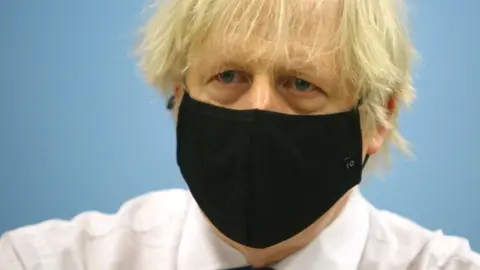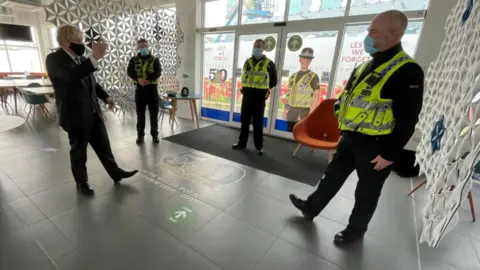Boris Johnson says devolution not an overall disaster
Devolution has not been an "overall" disaster, Boris Johnson has said.
Speaking on visit to a vaccination centre in Cwmbran, Torfaen, he said "it depends" what the devolved authorities do.
Since 1999, Wales, Scotland and Northern Ireland have had more control over their own affairs.
The comments come amid debate within the Conservative Party itself about the future of devolution and the union itself.
A group of Conservatives were recently selected to stand for the Welsh Parliament after telling members they would support abolishing the institution.
Plaid Cymru Liz Saville Roberts said Mr Johnson's defence of devolution was "lukewarm".
Mr Johnson's visit also took him to South Wales Police's headquarters in Bridgend, although a Senedd minister questioned whether he should have travelled to Wales given the current lockdown rules.
Asked if he thought devolution had been a disaster, Mr Johnson said: "Certainly not overall, absolutely not overall."
He said he had been a "proud beneficiary" of devolution when he was mayor of London.
"I think that devolution can work very well, but it depends very much on what the devolved authorities do," he added.
Also while on the visit, Mr Johnson said the UK and Welsh governments were working to "concert" their messages on lockdown.

What is devolution?
In Wales, the National Assembly was set up following a referendum in 1997.
Its powers grew and, after a further referendum in 2011, it gained law-making powers and has since changed its name to the Welsh Parliament/Senedd Cymru.
Elections to the Senedd determine what ministers form the Welsh Government, which is a separate body currently led by First Minister Mark Drakeford.

 Getty Images
Getty ImagesMr Drakeford has been in charge of Covid-19 restrictions in Wales and has been free to vary the rules from the UK government.
The two governments chose to go into lockdown at different times during the winter months and have, at times, disagreed on the messaging to the public. The whole of the UK is now under lockdown, however.
Mr Johnson said UK ministers were having "continuous conversations" with Mr Drakeford and the two sides tried "to make sure we concert our approach and concert our general messaging".
"Overall, if you look at infection rates across the UK, they are coming down a bit now, that's very encouraging."Mr Johnson added that while there were "some encouraging signs" this could be driven by vaccination and it was "still early days".
The prime minister said a "data not dates" approach would be "absolute right" in exiting restrictions in England.
Mark Drakeford recently partly blamed the UK government's programme of austerity as being behind high rates of coronavirus deaths in parts of the south Wales valleys.
Mr Johnson said he would be "reluctant to ascribe a single cause like that".
"Yes, sadly, some parts of the UK have been worse hit than than others," he said.
"I think that there will be a time where we go over everything and when the pandemic has really come to an end then we try to isolate all the particular causes, but I think it is multifactorial."

The UK government was recently warned to avoid "complacency" over the Welsh independence movement.
Mr Johnson told journalists that he was "confident" about the future of the union, although he said he wasn't complacent.
"I believe passionately in the Union. And I think that its, its advantages are clear."
"When you see vaccination being rolled out by the NHS invented in the UK, it's impossible not to be very moved and also very confident about the future of our of our country."
Essential travel?
Welsh Government Wellbeing Minister Eluned Morgan said she was not sure Mr Johnson's visit could be classed as essential travel.
She told a press conference: "Of course he is the prime minister of the United Kingdom, and has to make his own judgement on that.
"In an ideal world, I think, as many people as possible should stay at home and, yes, in an ideal world, perhaps that should have happened in this instance."
Work is an exception to the stay-at-home lockdown rules.
Ms Morgan said the relationship with the UK government had "ebbed and flowed".
She added: "In an ideal world, we would like to be coming out of the lockdown together, but at the end of the day we will do what is right for us in Wales, and that will depend on the rates of infection and how quickly we can roll out the vaccine, and we are doing incredibly well in Wales on that score."
Plaid's Liz Saville Roberts also criticised Mr Johnson's visit.
"This was a pointless 140-mile cross-border journey to Wales to make public comment on matters relating to England only," she said.
"Mr Johnson's lukewarm defence of devolution is undermined by his actions. This is a Prime Minister who has overseen the biggest Westminster power grab since the advent of devolution and has consistently refused to support Welsh lockdown measures with the financial support needed to make them work.'
